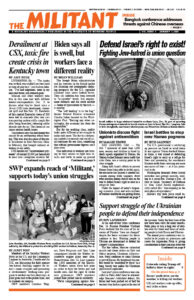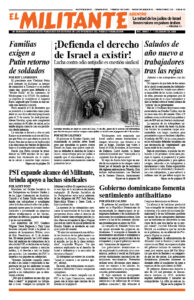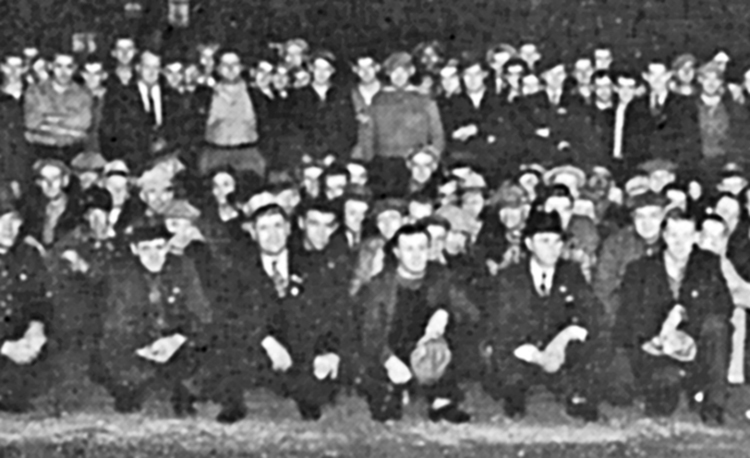SAN LEANDRO, Calif. — The Oct. 7 massacre of more than 1,200 men, women and children in Israel by death squads organized by Hamas, the Tehran-backed Islamist terror outfit that rules Gaza, was a turning point in the class struggle.
Along with Israel’s efforts to prevent Hamas from being able to do this again, the massacre has spurred a needed discussion among trade unionists about what position unions should take on the war to defend Israel’s right to exist as a refuge for Jews.
Under the impact of today’s deepening economic crisis and wars millions of workers worldwide are getting drawn into politics. Some union leaderships in the U.S., like in the United Auto Workers, the American Postal Workers Union and the United Electrical Workers are endorsing calls for a permanent cease-fire, pointing to the rising death toll in Gaza.
Several hundred turned out for a “Labor for Palestine” rally in Oakland Dec. 16. A statement by the organizers called for a permanent cease-fire, the end of U.S. aid to Israel and “an end to Israel’s occupation,” in effect a demand that Israel cease to exist.
“I’m against such a cease-fire because it means Hamas will continue to exist, attack Jews and pursue the destruction of Israel,” I told Abel Albor, a co-worker at the chocolate factory where I work. We’re members of Bakery, Confectionery, Tobacco Workers and Grain Millers Local 125. “Hamas started the war with its Oct. 7 massacre and continues rocket attacks on Israel. Some say Israel is responsible for civilian deaths in Gaza, but Hamas uses Palestinians as human shields.”
“Hamas hides behind women and babies,” Albor agreed. “They need to be defeated.”
Socialist Workers Party member Eric Simpson also works at the plant. Since Oct. 7 we’ve been presenting the party’s response to Hamas’ massacre and the need for the unions to combat Jew-hatred to fellow workers.
I told shop steward Joann Velasquez I thought it was wrong for unions to call for a cease-fire.
“Unions shouldn’t take any position,” she replied.
“I think the labor movement does have a big stake in opposing the destruction of Israel,” I said. “Unions fought against Jew-hatred in the U.S. in the 1930s.” In Minneapolis the leadership of the Teamsters initiated a defense guard to protect picket lines and unionists against the Silver Shirts, an anti-union Jew-hating fascist outfit that was backed by some of the city’s bosses. “Today labor should defend Israel’s right to exist.”
“When someone attacks you, you have to fight,” Velasquez said.
Simpson and I discussed with Martha Bautista, a machine operator trainee, how Israel’s formation became inevitable after the betrayal of revolutionary struggles in Europe in the 1930s by Stalinist parties. These struggles could have brought workers to power, but their defeat led to the Nazis taking power and to the Holocaust. In addition, Washington and London refused to allow entry to masses of Jewish refugees seeking to escape the Holocaust, the slaughter of 6 million Jews.
“Why did the U.S. turn away the Jews?” she asked.
“The billionaire rulers in this country are antisemitic,” I replied. “They had quotas on Jewish immigrants, even as Nazis stepped up the incineration of Jews. And they care only about profits, not human beings. The Socialist Workers Party demanded Washington open its doors to the Jews.”
I told machine operator Seng Saeliew that I had been booed by some participants at a recent Berkeley City Council public meeting when I argued against calls for a cease-fire. I’m the Socialist Workers Party candidate for U.S. Congress from California and had attended the meeting to present the party’s campaign.
“A lot of young people who support the Palestinian struggle call for support of Hamas,” Saeliew said. “They have been misled to think it’s a liberation organization. It’s the opposite.”
An Algerian mechanic, who is a Berber, an oppressed nationality in North Africa, told Simpson he opposes Hamas because of his own bitter experience with similar repressive Islamist currents in Algeria.
These discussions highlight why the labor movement needs its own foreign policy. The unions have no interest in calling for an end to the fight against Hamas. The defeat of Hamas will open political space for working people who are Palestinian, Jewish, Christian and workers of all nationalities and religions in the Middle East, creating better conditions to build united struggles against the exploiting classes and the governments that serve them. Already Gazans are speaking out against Hamas’ responsibility for what they have been put through.
Dealing a decisive blow to Hamas will also help push back similar forces around the world who scapegoat Jews for the crisis created by capitalist exploitation. Jew-hatred will be the banner of reactionary outfits that the capitalist rulers turn to, to try to crush the unions, as they did in Hitler’s Germany in the 1930s. Fascist assaults on Jews went hand in hand with attacks on workers, unions and revolutionary working-class parties.
The building of unions that can fight boss attacks is strengthened whenever workers take on and fight forces that try to utilize Jew-hatred here or elsewhere around the world.
Eric Simpson contributed to this article.


